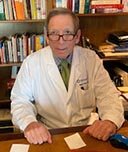The Second Booster and Other COVID Advice
 Dr. Michael Hinds of Martin
Dr. Michael Hinds of MartinDear Fellow Weakley Countians,
The most frequently asked COVID question that I am hearing now is “Should I take the second booster?” There is not an easy, one size fits all, answer to this question. The FDA has approved a second booster for people 50 years old and older, four months after their first booster. However, the CDC has not necessarily recommended that we take it. I will try to briefly explore some issues and give some guidelines to help you with your individual decisions.
If you are significantly immunocompromised you should take the second booster four months after the first. This would apply to persons on significant immunosuppressant medication, such as those used to fight organ transplant rejection or certain autoimmune disorders such as Lupus, Rheumatoid Arthritis, Ulcerative Colitis and the like. This would also apply to persons taking chemotherapy for malignancies and persons with acquired and inherited diseases that weaken the immune system such as Leukemia, AIDS, antibody deficiencies, etc. People with these problems are at increased risk to infections and also may not respond as well to vaccines as the rest of us. So, the more their immune systems are prepared to be ready to fight the COVID virus, the better.
A group who should strongly consider getting a second booster are those who are increased risk of severe or even fatal disease should they become infected with the COVID virus. This group includes persons over 65 years old and those with significant chronic diseases such as heart disease, lung disease, kidney disease, liver disease, diabetes, and obesity. For this group the question is more when than if they should get the second booster. Experience has shown that the highest levels of immunity to COVID achieved after a vaccine will only last for a few months. Our immunity will not go away completely a few months after vaccination but will begin to wane. For this reason, some might choose to wait until the fall to get their second booster, thus, to have their peak immunity during the fall and winter months, when case rates are likely to rise. Some of my patients plan to travel and want to delay their second boosters until a few weeks before their trips. These delays sound reasonable to me, as we currently have a low level of disease activity in our county. If, however, our level of disease activity begins to increase significantly this would be the time to go ahead and get the second booster.
In the US now, most cases of COVID are due to the latest variant, Omicron BA.2. This strain is thought to be slightly more contagious than the previous Omicron strain that was responsible for our most recent wave of cases. The good news however is that people who were infected by this recent Omicron strain, and that was a lot of people, are significantly immune to this new strain. In fact, if you are immunocompetent and were infected during this last wave, you do not need a booster now. Also, our vaccines show considerable efficacy against it. The experts predict some increase in cases from this variant, but not as severe an outbreak as we have seen previously. Let’s hope that they are right. So far, they have been.
These are some CDC recommendations for Weakley Countians at the present time:
- If you have symptoms of COVID, get tested.
- If you have symptoms of COVID, have been exposed to COVID, or have tested positive for COVID you should wear a mask for at least five days, longer if you remain symptomatic.
- If you are not immunocompromised and have been vaccinated and boosted, and do not have recent symptoms of, exposure to or a positive test for COVID, you do not necessarily need to wear a mask.
Of course, anyone can choose to wear a mask at any time. For instance, I strongly believe that persons in the health care industry should wear high quality masks, even if vaccinated and boosted. This, to protect our patients particularly the ones at high risk.
Lastly, if you have not been vaccinated, do so. If you have been vaccinated and not boosted, get your booster. Worldwide, more than 11.4 billion jabs have been given, and the fact of their safety and effectiveness has been proven. Anyone who tells you differently, is not serving your best interest and is putting you and others at risk of serious disease and even death. Many of us have already fallen victim to their misinformation. Do not let it happen to you.
It is a privilege to be your neighbor.
Michael Hinds, MD





